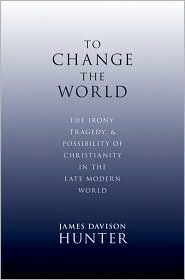
Hunter is well-known for his 1991 book Culture Wars, where he chronicled the divisions and battle between progressive secularists and orthodox Christians and other believers on such issues as abortion and gay rights. In his new book To Change the World: The Irony, Tragedy, and Possibility of Christianity in the Late Modern World
(Oxford University Press), Hunter argues that whole attempt to turn American culture and society to Christian values by activism and other political means has been shown to yield minimal impact. Throughout the book Hunter criticizes new Christian right leaders, such as James Dobson and Charles Colson, as well as religious left figures, such as Jim Wallis, for pursuing an impossible strategy.
Even though the new Christian right is still alive and reconstituting itself through new organizations such as Legacy and Reclaiming the 7 Mountains of Culture, Hunter writes that the movement peaked in 2004. When the movement held the most power, it managed to “generate greater hostility toward the Christian faith than ever before in the nation’s history-more anticlericalism among ordinary Americans and more disaffection among a younger generation of theologically conservative believers.”
The reaction against the new Christian right turned many toward other political options, such as the Christian left and what Hunter calls the “neo-Anabaptists.” The religious left consists of mainline Protestant groups and progressive evangelicals who have been strong supporters of President Barak Obama, and who work for liberal social reform. The neo-Anabaptists include those Christians who see the church as a refuge from a corrupt militaristic and capitalist society, and includes a movement called the new monasticism, which stresses identification with the poor and adopting a simple, contemplative lifestyle.
Hunter, who is an evangelical Christian, writes that these attempts to change (or resist) American society along Christian lines are bound to fail because they misunderstand the nature of cultural change in pluralistic and modern societies. Efforts to change a culture though law, policy and political mobilization get caught up in power struggles that turn negative and resentful when one side wins and the other side loses. The idea that if many Christians can apply a biblical worldview to various institutions and spheres of life or convert enough people they can “conquer the culture” also ignores the fact that cultural change rarely takes place on a popular or grassroots level.
The author argues that cultural change occurs through a “dense network of elites operating in common purpose within institutions at the high-prestige centers of cultural production.” Hunter recounts the rise of Christianity in the Roman empire as an example where Christians “made their way into elite circles of wealth, power and culture” and were able to challenge the dominant powers. In contrast, Christianity in the U.S. and the modern West is a “weak culture” that is institutionally divided and draws most people outside of the elite spheres of influence, such as politics, entertainment and academia.
Hunter adds that he is not saying that Christians don’t have any influence on what he calls the “post-Christian” culture. But the main way they do this is by “faithful presence,” where they seek to serve the common good in their various vocations. He gives the examples of Christians starting schools in poor areas and a business that was restructured to stress mentoring employees rather than impersonal management and production.
Hunter concludes that the challenge for churches is to help Christians contribute to the flourishing of culture without encouraging an elitist mindset that often comes with gaining positions of influence in society.
Richard Cimino
Richard Cimino is the founder and editor of Religion Watch, a newsletter monitoring trends in contemporary religion. Since January 2008, Religion Watch is published by Religioscope Institute. Website: www.religionwatch.com.